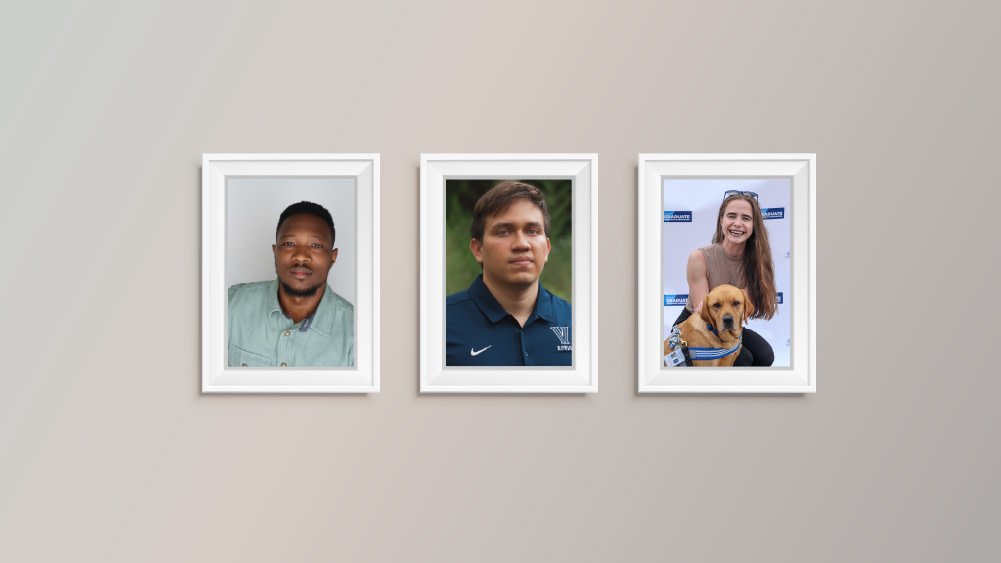When Heidi was looking at American colleges that fit her career goals, Villanova, near Philadelphia, was at the top of the list. Originally from Vietnam, Heidi was working in Chicago, but looking for a Master of Science in Finance program that would help take her career to the next level. Villanova stood out at the top of the list.
Though every student has their own reasons for choosing Villanova, Heidi’s experience was similar to David from Nigeria, currently pursuing a Master of Arts in Political Science; Nika from Russia, studying for her Master of Public Administration degree; and Luis from Ecuador, working toward a PhD in Electrical and Computer Engineering.
“I was feeling stuck,” explained Luis, who wants to conduct biomedical research in his future career. It was this goal that led him to the research of a Villanova professor — who is now his current advisor. “It is important to be at a good school. It is even more important to have a good advisor [who] understands what you want to do with your life.”
Nika decided to attend Villanova after visiting campus and discussing her career goals with her program director and an academic advisor. “Look for virtual information sessions with advisors,” she recommended to prospective students.
For David, Villanova’s academic reputation brought him to campus, but the strong sense of community solidified his choice. “From day one, I felt welcomed by the staff, faculty, and students, which made adjusting as an international student much easier,” he said.
Villanova Academics: Challenging and Rewarding
There may be several American colleges that offer the coursework and requirements you want. So, how do you choose your school?
For Heidi, Villanova offered a connection between coursework and the working world. “I knew what I wanted to improve in for myself and my future career path,” she explained. “You need to know what you are looking for and where you want to grow.”
Access to top-notch professors also drew her to Villanova.
“One thing I love is that the class sizes are small enough to really get to know my professors and peers, which makes learning feel more personal and interactive,” she said.
Luis, Nika, and Heidi all agreed, praising the quality of the professors and the ability to ask them anything.
“You can just come up to the professor,” said Heidi. “I had a lot of questions about my career path. So, I asked all my professors what they thought about the market, what I want to do, and for suggestions on potential career paths.”
If you want to do research, Luis recommended looking at the type of research professors are currently doing and if their work connects with your goals.
For example, David has been able to research how veto power in the UN Security Council affects global conflicts. “Villanova’s academic environment encourages deep exploration of topics that matter,” he said. “That is something I really appreciate.”
What Is it Like Living at Villanova?
One of the first things you may notice about Villanova is its beautiful campus, just a short drive from Philadelphia. The older buildings remind some students, including Nika, of Hogwarts from the Harry Potter series.
The international students also mentioned how the campus is very clean and safe. In Luis’s case, this was particularly reassuring to his mother. “There is a great community here,” he said.
Community is crucial when moving to another country, and Luis recommended finding people who share your interests. He joined a rowing club and running group. Now he has a group of friends who go rock climbing and hiking in and around the Philadelphia area.
“It is OK to feel homesick and lonely,” he starts. “It is not OK to do nothing about it. You need community and there is community [here].”
If you are struggling with homesickness, Villanova has on-campus mental health services to help you navigate the transition.
Villanova has an extensive off-campus housing website and additional online resources that will help you find housing in the area. “It is so convenient for me,” Heidi said about her commute to campus, noting she was able to sell her car before arriving. She can easily walk to cafes, restaurants, and shopping centers.
Though she lives off campus, Heidi spends most of her time on campus — and loves it. The on-campus perks like coffee shops, spaces to hang out with friends, and a “really nice gym” offer downtime from studying.
When she is not on campus, Heidi takes advantage of convenient access to New York City, just a couple of hours away by train. She wants to work in the city after graduation, so going to Manhattan on a regular basis allows her to network with industry professionals.
Get Additional Help from Campus Support Services
At Villanova, you have access to all the resources you need to succeed. As David said, “you just have to be willing to reach out!”
Specifically, David cites the Office of International Students and Scholars (OISS) and the Center for Graduate Research and Education (Grad Center).
David has nothing but praise for the OISS team, who can help you navigate things like visa regulations. “The team is amazing! [They] are very thorough and knowledgeable.”
As for the Grad Center, it offers more than just space to study. You can find professional development workshops, peer mentorship, social events, networking opportunities, and more.
Both David and Nika mention the Graduate Student Emergency Fund, which offers financial assistance to students facing unexpected hardships, as a huge mental relief. “I have benefitted from this and it truly shows how much Villanova cares about students’ wellbeing,” David shared.
Nika agreed. “It is an emotional support knowing that someone can help you.”
For professional guidance, the Career Center can assist with applying to internships, including resume writing, interview prep, and job search strategies. “They have career coaches as well,” Heidi added.
Real-Life Career Preparation
Part of how Villanova prepares its graduate students for life beyond the classroom is by offering opportunities for real-life experience in your field.
For Heidi, who is currently doing equity research, having access to labs with Bloomberg, a computer software system that allows students to analyze real-time market and economic data, is extremely helpful to furthering her career.
Events like the 3MT competition, or Three Minute Thesis, allows students to showcase their research communication skills. Nika recently won this annual competition. Her research, focused on identifying barriers to women’s leadership, paved the way to introductions with Villanova alumni who are CEOs in the nonprofit space.
These alumni relationships have also connected her with internship opportunities. “Alumni are really helpful to students looking for job opportunities,” she stressed, noting that her current part-time role will turn into a full-time role after graduation. “I feel really confident that, even if this role did not work out, I can reach out to alumni and will be able to find a different role quite easily.”
Nika also participated in Villanova on the Hill, one of the one-week immersion experiences Villanova offers students during summer, fall, and spring breaks. As part of her experience, Nika went to Washington, DC, to meet with alumni and network — and even got to have a one-hour conversation with a Supreme Court Justice.
David is the Graduate Student Senate International Student Affairs Officer and president of the African and Caribbean Graduate Students Association, which hosts cultural events, networking opportunities, and community-building activities.
But he said his role as a peer mentor for the Villanova Leadership program and participation in the Service and Justice Experience trips have been the most fulfilling. “Getting to travel, work on real projects, and make an impact in different communities has been unforgettable.”
Advice for International Students Considering Villanova
While all the students we spoke with love Villanova and sum up their advice to “go for it!,” they have deeper insights for students who want to make the most of their experience.
1. Get Involved Early
For Heidi, getting involved early means reaching out to Villanova — before you are even on campus. “Don’t be shy: reach out to the school. They’re really willing to help you,” she said.
Nika agreed. “Connect with your academic department,” she suggested. “Even if you have a 15-minute Zoom call, it is really helpful for them to get to know you as a potential student and it is helpful for you to understand if the people and program are a great fit for you.”
Nika added that sometimes program names do not translate abroad. Asking about various programs can help you determine which one is the best fit for your goals.
Once you are on campus, “join student organizations, attend events, and connect with people,” said David. “It makes a huge difference in feeling at home.”
2. Ask for Help
“People are really willing to help if you are just willing to ask,” said Heidi, acknowledging that it can feel difficult to start the conversation by asking your question. But once you do it, people will either answer your question or, if they do not know the answer, guide you to someone who can better support you.
3. Explore Beyond Campus
“Philadelphia has so much to offer,” stressed David. “From history to networking events to great food, make time to experience it!”
Nika seconded David’s suggestion to network. “It is so easy to connect with alumni as a student,” she said, pointing out that your Villanova connection is a natural starting point for a conversation.
Above all, enjoy the journey. “The friendships, experiences, and growth you’ll have here will be totally worth it,” said David.
“Villanova isn’t just a school,” he continued. “It is a community that supports you, challenges you, and prepares you for what is next. If you’re looking for a place that values academic excellence and personal growth, this is it!”
Discover Villanova University >

